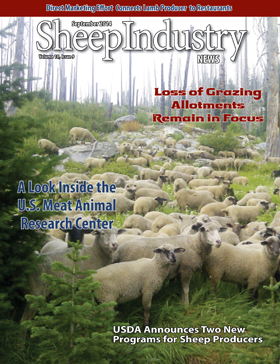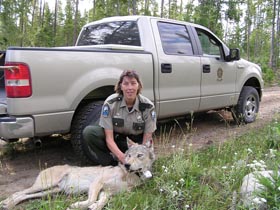
- September 2014
- President’s Notes
- Market Report
- Commentary: Stand Against Activist Organizations
- Direct Marketing: Watson’s Direct Marketing Approach Includes ‘Custom Growing’ Lambs for Fine Restaurants
- Easycare Sheep and Elimination of OPP Focus of U.S. Meat Animal Research Center
- Listening Sessions Invoke Support for U.S. Sheep Experiment Station
- Loss of Grazing Allotments Remain in Focus
- Undersecretary Visits ASI Office to Announce Programs That Will Benefit Sheep Producers
- Washington Rancher Allowed to Defend Flock in Wake of Wolf Attacks
- News Briefs
![]()
Washington Rancher Allowed to Defend Flock in Wake of Wolf Attack
A rancher in northeastern Washington was given permission in August to shoot wolves approaching his sheep herd of nearly 2,000 animals.
Rancher Dave Dashiell, of Hunters, was working with the Washington Department of Fish and Wildlife to try to prevent wolf attacks on his flock. As of Aug. 25, he had reported that wolves had killed 22 of his sheep.
“We continue to find more dead and wounded sheep from the flock,” said Bruce Botka, a WDFW spokesman. Botka said Dashiell’s situation meets the state’s conditions for lethal removal of wolves, which are protected in eastern Washington by state endangered species laws.
The pack is one of about a dozen wolf packs confirmed in eastern Washington.
“There have been repeated, documented wolf kills; non-lethal methods have not stopped the predation; the attacks are likely to continue, and the livestock owner has not done anything to attract the wolves,” Botka said. Officials approved the killings for the Huckleberry Pack in Stevens County. Four department employees, two federal staff and two contracted range riders worked with Dashiell to prevent additional attacks.
“Despite those efforts, sheep continue to be killed by wolves,” Botka said.
Washington law allows ranchers to kill up to one wolf if caught in the act of attacking domestic animals. WDFW gave Dashiell and the agency staffers guarding the flock the authority to kill up to two wolves if spotted near the sheep even if they weren’t attacking.
Gunners in a helicopter began flying over the area near Hunters on Aug. 23. A wolf was spotted, but officials said no wolves were killed on the first day. A male wolf is wearing a radio collar that researchers attached to monitor the pack.
The Huckleberry Pack, named for the nearby Huckleberry Mountains, was documented as a pack in 2012.
The pack had not been associated with attacks on livestock until this incident, officials said.
Meanwhile, a conservation group shortly after the decision to allow the wolf killings, argued the state of Washington did not exhaust non-lethal methods before ordering the hunt.
“It’s unconscionable that a public agency would take action to kill an endangered species without notifying the public. These wolves belong to the public and decisions about whether they live or die ought to be made in the clear light of day,” said Amaroq Weiss, West Coast wolf organizer with the Center for Biological Diversity, in a statement.
But the Stevens County Cattlemen’s Association criticized WDFW for not notifying the rancher of the presence of wolves in the area. The events are reminiscent of the 2012 Washington wolf attacks on cattle in northern Stevens County that didn’t end until the state was forced to use helicopter gunners to kill all seven members of the Wedge Pack.
Rancher thought it was a cougar
According to WDFW officials, Dashiell notified the agency in early August that nine of his sheep, out of a flock of about 1,800, grazing on private property just north of the Spokane Indian Reservation, had been killed by a cougar, or perhaps more than one.
A hound hunter contracted by the WDFW reached the site intending to remove the cougar, and instead found 14 more dead sheep –but no cougar tracks, sign or scent anywhere near these newer carcasses. Instead, the hound hunter found what appeared to be wolf tracks.
Jay Shepherd, a WDFW wildlife conflict specialist based in Colville, returned with the hound hunter to investigate the scene and confirmed that the tracks had indeed been made by wolves and that the 14 sheep found had been killed by wolves. According to the Cattlemen’s Association, the estimated financial damage to Dashiell is already over $5,000. Should Dashiell have to pen the herd and feed hay until fall pasture is available, the association said that would mean another $35,000 in feed alone.


